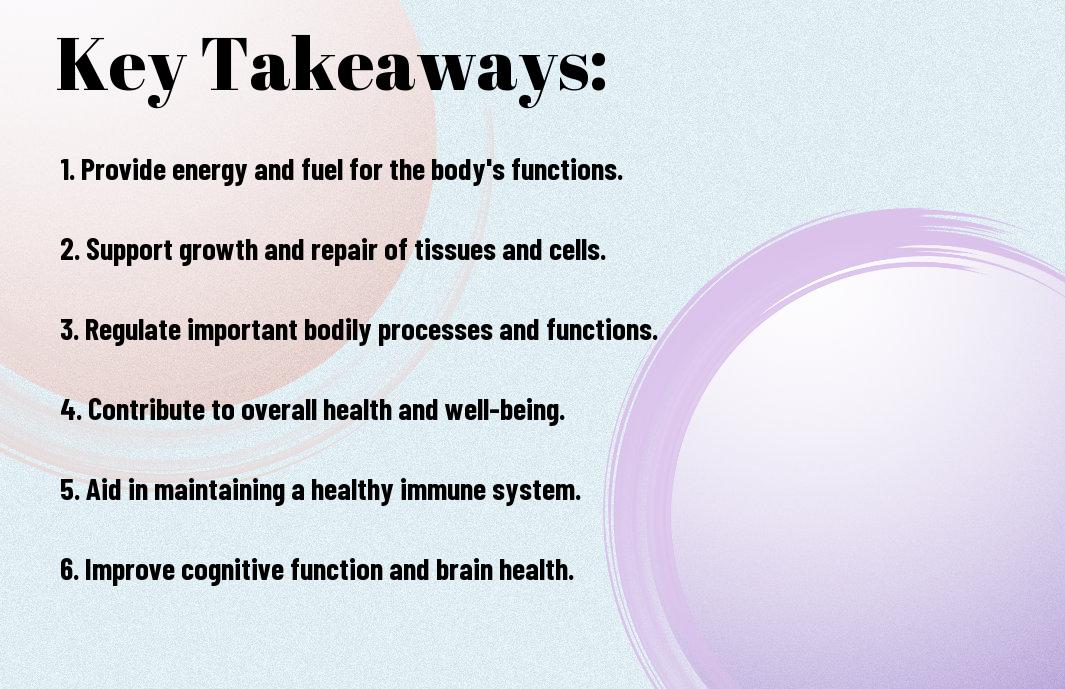With so much focus on what you should or shouldn’t be eating, have you ever thought about why we eat in the first place? Understanding the five functions of food can provide valuable insight into the importance of a balanced diet for your overall health and well-being. Let’s examine into the key roles that food plays in fueling your body, supporting growth and repair, regulating bodily functions, protecting against diseases, and providing pleasure and enjoyment.

Key Takeaways:
- Provide energy: Food supplies the body with the energy it needs to perform daily activities and maintain bodily functions.
- Build and repair tissues: Food contains necessary nutrients that help in the growth, repair, and maintenance of body tissues.
- Regulate bodily functions: Nutrients in food play a key role in regulating various physiological processes in the body, such as metabolism and hormone production.

Providing Energy
While 1. The Function of Food encompasses various roles, one of the primary functions is providing energy. Your body requires energy to perform everyday tasks, from basic functions like breathing and circulating blood to more active pursuits like exercising and thinking. This energy primarily comes from the foods you eat.
The Role of Macronutrients
For optimal energy provision, your diet should include macronutrients such as carbohydrates, proteins, and fats. Carbohydrates are your body’s preferred energy source, quickly converting into glucose for immediate use. Proteins play a vital role in building and repairing tissues, but they can also provide energy when carbohydrates are limited. Fats are a concentrated source of energy and play a key role in hormone production and nutrient absorption.
Measuring Energy Needs
The estimation of your daily energy requirements is necessary to maintain a healthy balance. The number of calories you need depends on various factors, including your age, gender, weight, height, and activity level. The most common way to measure energy needs is through the Basal Metabolic Rate (BMR) calculation, which estimates the energy required for basic bodily functions at rest.
The BMR is then multiplied by an activity factor to determine your total daily energy expenditure (TDEE). This includes energy needed for physical activities and other daily tasks. Understanding your TDEE can help you tailor your diet to meet your energy requirements and achieve your health goals effectively.

Building and Repairing Tissues
The Importance of Protein
On your journey to understanding the functions of food, it’s crucial to grasp the significance of protein in building and repairing tissues. Protein is composed of amino acids, which are the building blocks of your body. When you consume protein-rich foods like lean meats, poultry, fish, eggs, dairy products, beans, and nuts, you provide your body with the necessary amino acids to repair and maintain tissues such as muscles, organs, and skin.
How Food Affects Growth and Development
Development of your body, especially during childhood and adolescence, relies heavily on the nutrients you consume. Essential vitamins and minerals obtained from a balanced diet play a pivotal role in supporting growth and development. For example, calcium is crucial for building strong bones and teeth, while vitamin A is important for healthy vision. By incorporating a variety of nutrient-dense foods such as fruits, vegetables, whole grains, and dairy products into your diet, you can ensure that your body receives the necessary nutrients for optimal growth and development.
Building a strong foundation for growth and development through proper nutrition is important for ensuring your body functions at its best throughout your life. By understanding how food affects your body’s ability to grow, repair, and maintain tissues, you can make informed choices to support your overall health and well-being.
Regulating Body Functions
Many of the functions of food involve regulating various processes within your body to maintain optimal health. From providing necessary vitamins and minerals to controlling hormone balance, the role of food in regulating body functions cannot be understated.
The Role of Vitamins and Minerals
An necessary function of food is to provide your body with the necessary vitamins and minerals it needs to function properly. Vitamins and minerals play crucial roles in a wide range of bodily functions, from supporting a strong immune system to aiding in metabolism and energy production.
Maintaining Healthy Hormone Balance
On top of providing necessary nutrients, food also plays a key role in maintaining healthy hormone balance within your body. Hormones act as chemical messengers, regulating various processes such as metabolism, growth, and mood. By consuming a balanced diet rich in nutrients, you can help support your body’s hormone production and balance.
Another important aspect of maintaining healthy hormone balance is ensuring you consume an adequate amount of healthy fats. Essential fatty acids found in foods like salmon, avocado, and nuts are crucial for hormone production and overall hormonal health.
Supporting Immune Function
The Connection between Food and Immunity
Keep your immune system strong by fueling your body with the right nutrients. The foods you eat play a vital role in supporting your immune function and overall health. A well-balanced diet rich in vitamins, minerals, antioxidants, and phytochemicals can help strengthen your body’s defense against infections and diseases.
How Nutrients Boost Immune Response
Boost your immune system with a variety of nutrients found in fruits, vegetables, whole grains, lean proteins, and healthy fats. Vitamins such as Vitamin C, Vitamin D, and Vitamin E, along with minerals like zinc and selenium, are crucial for a robust immune response. These nutrients work together to support the production of white blood cells, antibodies, and other immune components that help fight off harmful pathogens.
Immune-boosting nutrients also have antioxidant properties that help reduce inflammation and oxidative stress in the body, further enhancing your immune function. Including a colorful array of fruits and vegetables in your diet not only provides vital vitamins and minerals but also delivers a range of antioxidants that can help protect your cells from damage and strengthen your immune system.
Maintaining Healthy Weight
The Relationship between Food and Metabolism
Healthy weight maintenance is crucial for your overall well-being. One key aspect of managing your weight is understanding the relationship between food and metabolism. Your metabolism is the process by which your body converts the food you eat into energy. It determines how many calories you burn and plays a significant role in weight management. Eating a balanced diet with the right nutrients can help support a healthy metabolism.
Balancing Calorie Intake and Expenditure
Weight management is all about balancing the calories you consume with the calories you burn. To maintain a healthy weight, you need to ensure that you are not consuming more calories than your body needs. This means paying attention to portion sizes and being mindful of the types of food you eat. Incorporating physical activity into your routine can also help increase calorie expenditure, making it easier to maintain a healthy weight.
Plus, being aware of hidden calories in processed foods and sugary beverages can also make a significant difference in managing your weight. Opting for whole, nutrient-dense foods can help you feel fuller for longer periods and support your overall health goals.
Supporting Healthy Digestion
Now, let’s research into how food supports healthy digestion. One of the key elements in promoting good digestion is including an adequate amount of fiber and water in your diet.
The Role of Fiber and Water
Supporting your digestive system with sufficient fiber and water is crucial. Fiber helps in moving food through your digestive tract, promoting regular bowel movements and preventing constipation. It also adds bulk to your stool, which can help with the feeling of fullness and aid in weight management. On the other hand, water is necessary for digesting and absorbing nutrients from your food effectively. It helps in breaking down food particles and moving them smoothly through your digestive system.
How Food Affects Gut Health
Supporting your gut health through the foods you eat is imperative for overall well-being. Certain foods can either promote or hinder the balance of good bacteria in your gut. For instance, including probiotic-rich foods like yogurt and kefir can help maintain a healthy gut flora, which is necessary for proper digestion and immune function. On the contrary, consuming a diet high in processed foods and sugar can disrupt the delicate balance of bacteria in your gut, leading to digestive issues and potential health problems.
Affects of food on gut health are far-reaching, influencing not only digestion but also immunity, mental health, and inflammation levels in the body. By nourishing your gut with a variety of whole foods rich in fiber, antioxidants, and healthy fats, you can support a thriving gut microbiome and overall digestive wellness.
Conclusion
On the whole, understanding the five functions of food is key to maintaining a healthy and balanced diet. By ensuring that you consume foods that provide energy, support growth and repair, regulate body processes, protect against diseases, and promote overall well-being, you can optimize your health and well-being. Remember to include a variety of nutrient-dense foods in your diet to reap the benefits of these necessary functions of food.
Q: What are the five functions of food?
A: The five functions of food are: providing energy, building and repairing body tissues, regulating body processes, boosting immunity, and supporting overall health and well-being.
Q: How does food provide energy to the body?
A: Food provides energy to the body through the conversion of carbohydrates, fats, and proteins into glucose, which is then used by the cells to fuel various functions and activities.
Q: Why is it important for food to support immunity?
A: Food plays a crucial role in supporting immunity by providing crucial nutrients like vitamins, minerals, antioxidants, and phytochemicals that help strengthen the immune system and protect the body against infections and diseases.



